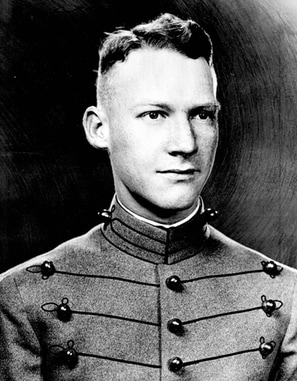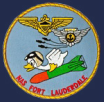
Lieutenant Alexander Ramsey "Sandy" Nininger Jr., Hero of Bataan
U.S. Army, 57th Infantry, Philippine Scouts
Lt. Nininger was the first Army soldier to receive the Medal of Honor during World War II, for his extraordinary actions in combat during the Japanese invasion of the Phillipines. After charging through the Japanese lines, Nininger eventually succumbed to his wounds, and his body was found in a foxhole, surrounded by the bodies of 3 Japanese soldiers (including an officer). Recommended by General MacArthur, Nininger was awarded the Medal of Honor posthumously. His Medal of Honor citation is as follows:
Citation: " For conspicuous gallantry and intrepidity above and beyond the call of duty in action with the enemy near Abucay, Bataan, Philippine Islands, on 12 January 1942. This officer, though assigned to another company not then engaged in combat, voluntarily attached himself to Company K, same regiment, while that unit was being attacked by enemy force superior in firepower. Enemy snipers in trees and foxholes had stopped a counterattack to regain part of position. In hand-to-hand fighting which followed, 2d Lt. Nininger repeatedly forced his way to and into the hostile position. Though exposed to heavy enemy fire, he continued to attack with rifle and hand grenades and succeeded in destroying several enemy groups in foxholes and enemy snipers. Although wounded 3 times, he continued his attacks until he was killed after pushing alone far within the enemy position. When his body was found after recapture of the position, 1 enemy officer and 2 enemy soldiers lay dead around him."
Alexander R. Nininger was born in Gainesville, Georgia on 2 October 1918, but was raised in Fort Lauderdale, attending and graduating Fort Lauderdale High before moving on to the United States Military Academy at West Point. After being commissioned as a Lieutenant, Nininger asked for duty in the Philippines and was assigned to Bataan. He was attached to the 57th Infantry Regiment, Philippine Scouts, where he would come face to face with Japan's seemingly unstoppable military, which was riding high on countless victories over Allied forces across the Pacific. In these initial months when America became involved in the war, the Japanese would invade the Philippines, whose garrison was under the command of the legendary General Douglas MacArthur.
On January 12, 1942, facing overwhelming odds and firepower, Nininger's company was ordered to prepare defenses for the inevitable Japanese attack. However, the sector his company was assigned to was quiet, and reports from neighboring companies detailed a counter-attack under way to retake positions currently occupied by the Japanese. Sensing he could contribute to the counter-attack, Nininger voluntarily joined neighboring Company K to assist in retaking vital defensive positions. Soon, the order was given to drive the enemy back, and from the get-go the fighting was tough and brutal. Men fell around him on both sides to sniper, machine gun, and artillery fire, yet Nininger carried on, shooting snipers out of trees and tossing grenades into Japanese foxholes as he relentlessly advanced forward. He was shot several times, yet continued forward seemingly unconcerned by the chaos and certain death looming all around him. Foxhole after foxhole, sniper after sniper was eliminated by Nininger's well aimed grenades and rifle fire, as well as picking up Japanese weapons to use against them. Despite nearly being a one-man army, the odds were still greatly stacked against him, and eventually his wounds would catch up with him. It is difficult to say how many Japanese were slain by Nininger, but piece by piece his men were able to trace his path of destruction, eventually ending in one final foxhole, where Nininger's body was found along with the bodies of 3 Japanese soldiers.
Sandy Nininger's show of extreme valor against superior forces that day inspired other members of his unit— the legendary Philippine Scouts, to rally together and counter attack, changing forever the course of the war. General McArthur later reported that this action on January 12, 1942, gave him the needed time to organize the defenses of Manila Bay and Corregidor. Precious time that would allow the Americans to successfully retake vital positions for a few days, in a battle where days were vital for the vastly outnumbered and outgunned American-Philippine defenders. Upon hearing of Nininger's valorous deeds, President Franklin Roosevelt bestowed upon Nininger, posthumously on January 29, 1942, the first Congressional Medal of Honor to be awarded during World War II.
Decades later, and indeed for all time, Nininger has been remembered and immortalized by those who knew him in life and in war. Many plaques and statues exist to his honor in Georgia, Fort Lauderdale, and the Philippines. A ship, the USS Alexander R. Nininger was commissioned December 7, 1944. In 1974, Nininger's fellow West Point classmates donated a permanent home for the Cadet Honor Committee. For his classmates, the name of this new building was obvious: Nininger Hall. Today, Lieutenant Nininger's remains rest in an unknown grave near a long forgotten battlefield half-a-world away from the banks of the New River in Fort Lauderdale, where as a boy, he played, fished and swam. In his honor, Navy veteran and author Richard Winer, along with Nininger's 1941 West Point class, the Broward County Commission, and the Sailboat Bend Civic Association, gathered funds to erect a "Broward's Unknown Soldier" memorial statue featuring Nininger along the winding walkway of the New River. The 700-pound bronze statue was created by Hallandale artist Enzo Gallo, and it was presented to the People of Fort Lauderdale, on Memorial Day, 1994. A memorial wall next to the statue, features the names of all Broward County residents who died fighting for their country from World War I, to the most recent conflicts. There is also a plaque for Lt. Nininger near War Memorial Auditorium in Fort Lauderdale's Holiday Park, where a short street is named for him, and another plaque near the Broward County Main Library in downtown Fort Lauderdale. Also named in his honor, is a State Veterans nursing home located in Pembroke Pines, featuring a collection of WWII artifacts.
Alexander R. Nininger Decorations and Awards:
Congressional Medal of Honor, Purple Heart, Purple Heart with one Bronze Oak-Leaf Cluster, American Defense Service Medal with Foreign Service clasp, World War II Victory Medal, Asiatic-Pacific Campaign Medal with one Bronze service Star for the Philippine Islands Campaign, Combat Infantryman Badge, Distinguished Unit Emblem with two Bronze Oak Leaf Clusters, and Philippine Defense Ribbon with one Bronze Service Star.
Nininger's Letter to his Father:
The following text is from a letter written by Alexander Nininger, as a cadet at the United States Military Academy in West Point, N.Y. He was 19 years old at the time. This letter was revealed to the public for the first time at the fourth annual convention of the Florida Association of Key Clubs at Tampa, Florida on March 28, 1942 following his death on Bataan in the Philippines on January 12, 1942 (Philippine time). The original is preserved by his High School, in Fort Lauderdale, Florida.
****************************************************************************************************************************************************************************
West Point, N.Y.
October 18, 1938
"Dear Dad,
Today I am writing this for you especially, because it is your birthday. You see I have not forgotten it. Yet there is nothing I can send you but my thoughts and my love, which you already have. Tonight I am thinking of your birthdays, as we have held them together before, and as we will again. We are together in the quiet and comfort of the living room, Mother sitting in her chair and you in yours, smoking a cigar and smiling your “prosperous smile”. I see in your two faces all the love that we have for one another, expressing the happiness of the home that you have made possible for us. I have always enjoyed your birthday so much, because there is always such a happy atmosphere about it. You appreciate so much the little things we are able to do for you as though you knew how much there is we would like to do. In the past, even the little presents I gave you were bought with your money. At least that will be changed next time, not that the money is important, but it will symbolize that turn in my life when I will begin to give a little in return on the investment of work and love that you both have put into me. Even then I will owe my position to you. Let my present, then, be a promise that I won't disappoint you. Happy birthday, Dad."
****************************************************************************************************************************************************************************
U.S. Army, 57th Infantry, Philippine Scouts
Lt. Nininger was the first Army soldier to receive the Medal of Honor during World War II, for his extraordinary actions in combat during the Japanese invasion of the Phillipines. After charging through the Japanese lines, Nininger eventually succumbed to his wounds, and his body was found in a foxhole, surrounded by the bodies of 3 Japanese soldiers (including an officer). Recommended by General MacArthur, Nininger was awarded the Medal of Honor posthumously. His Medal of Honor citation is as follows:
Citation: " For conspicuous gallantry and intrepidity above and beyond the call of duty in action with the enemy near Abucay, Bataan, Philippine Islands, on 12 January 1942. This officer, though assigned to another company not then engaged in combat, voluntarily attached himself to Company K, same regiment, while that unit was being attacked by enemy force superior in firepower. Enemy snipers in trees and foxholes had stopped a counterattack to regain part of position. In hand-to-hand fighting which followed, 2d Lt. Nininger repeatedly forced his way to and into the hostile position. Though exposed to heavy enemy fire, he continued to attack with rifle and hand grenades and succeeded in destroying several enemy groups in foxholes and enemy snipers. Although wounded 3 times, he continued his attacks until he was killed after pushing alone far within the enemy position. When his body was found after recapture of the position, 1 enemy officer and 2 enemy soldiers lay dead around him."
Alexander R. Nininger was born in Gainesville, Georgia on 2 October 1918, but was raised in Fort Lauderdale, attending and graduating Fort Lauderdale High before moving on to the United States Military Academy at West Point. After being commissioned as a Lieutenant, Nininger asked for duty in the Philippines and was assigned to Bataan. He was attached to the 57th Infantry Regiment, Philippine Scouts, where he would come face to face with Japan's seemingly unstoppable military, which was riding high on countless victories over Allied forces across the Pacific. In these initial months when America became involved in the war, the Japanese would invade the Philippines, whose garrison was under the command of the legendary General Douglas MacArthur.
On January 12, 1942, facing overwhelming odds and firepower, Nininger's company was ordered to prepare defenses for the inevitable Japanese attack. However, the sector his company was assigned to was quiet, and reports from neighboring companies detailed a counter-attack under way to retake positions currently occupied by the Japanese. Sensing he could contribute to the counter-attack, Nininger voluntarily joined neighboring Company K to assist in retaking vital defensive positions. Soon, the order was given to drive the enemy back, and from the get-go the fighting was tough and brutal. Men fell around him on both sides to sniper, machine gun, and artillery fire, yet Nininger carried on, shooting snipers out of trees and tossing grenades into Japanese foxholes as he relentlessly advanced forward. He was shot several times, yet continued forward seemingly unconcerned by the chaos and certain death looming all around him. Foxhole after foxhole, sniper after sniper was eliminated by Nininger's well aimed grenades and rifle fire, as well as picking up Japanese weapons to use against them. Despite nearly being a one-man army, the odds were still greatly stacked against him, and eventually his wounds would catch up with him. It is difficult to say how many Japanese were slain by Nininger, but piece by piece his men were able to trace his path of destruction, eventually ending in one final foxhole, where Nininger's body was found along with the bodies of 3 Japanese soldiers.
Sandy Nininger's show of extreme valor against superior forces that day inspired other members of his unit— the legendary Philippine Scouts, to rally together and counter attack, changing forever the course of the war. General McArthur later reported that this action on January 12, 1942, gave him the needed time to organize the defenses of Manila Bay and Corregidor. Precious time that would allow the Americans to successfully retake vital positions for a few days, in a battle where days were vital for the vastly outnumbered and outgunned American-Philippine defenders. Upon hearing of Nininger's valorous deeds, President Franklin Roosevelt bestowed upon Nininger, posthumously on January 29, 1942, the first Congressional Medal of Honor to be awarded during World War II.
Decades later, and indeed for all time, Nininger has been remembered and immortalized by those who knew him in life and in war. Many plaques and statues exist to his honor in Georgia, Fort Lauderdale, and the Philippines. A ship, the USS Alexander R. Nininger was commissioned December 7, 1944. In 1974, Nininger's fellow West Point classmates donated a permanent home for the Cadet Honor Committee. For his classmates, the name of this new building was obvious: Nininger Hall. Today, Lieutenant Nininger's remains rest in an unknown grave near a long forgotten battlefield half-a-world away from the banks of the New River in Fort Lauderdale, where as a boy, he played, fished and swam. In his honor, Navy veteran and author Richard Winer, along with Nininger's 1941 West Point class, the Broward County Commission, and the Sailboat Bend Civic Association, gathered funds to erect a "Broward's Unknown Soldier" memorial statue featuring Nininger along the winding walkway of the New River. The 700-pound bronze statue was created by Hallandale artist Enzo Gallo, and it was presented to the People of Fort Lauderdale, on Memorial Day, 1994. A memorial wall next to the statue, features the names of all Broward County residents who died fighting for their country from World War I, to the most recent conflicts. There is also a plaque for Lt. Nininger near War Memorial Auditorium in Fort Lauderdale's Holiday Park, where a short street is named for him, and another plaque near the Broward County Main Library in downtown Fort Lauderdale. Also named in his honor, is a State Veterans nursing home located in Pembroke Pines, featuring a collection of WWII artifacts.
Alexander R. Nininger Decorations and Awards:
Congressional Medal of Honor, Purple Heart, Purple Heart with one Bronze Oak-Leaf Cluster, American Defense Service Medal with Foreign Service clasp, World War II Victory Medal, Asiatic-Pacific Campaign Medal with one Bronze service Star for the Philippine Islands Campaign, Combat Infantryman Badge, Distinguished Unit Emblem with two Bronze Oak Leaf Clusters, and Philippine Defense Ribbon with one Bronze Service Star.
Nininger's Letter to his Father:
The following text is from a letter written by Alexander Nininger, as a cadet at the United States Military Academy in West Point, N.Y. He was 19 years old at the time. This letter was revealed to the public for the first time at the fourth annual convention of the Florida Association of Key Clubs at Tampa, Florida on March 28, 1942 following his death on Bataan in the Philippines on January 12, 1942 (Philippine time). The original is preserved by his High School, in Fort Lauderdale, Florida.
****************************************************************************************************************************************************************************
West Point, N.Y.
October 18, 1938
"Dear Dad,
Today I am writing this for you especially, because it is your birthday. You see I have not forgotten it. Yet there is nothing I can send you but my thoughts and my love, which you already have. Tonight I am thinking of your birthdays, as we have held them together before, and as we will again. We are together in the quiet and comfort of the living room, Mother sitting in her chair and you in yours, smoking a cigar and smiling your “prosperous smile”. I see in your two faces all the love that we have for one another, expressing the happiness of the home that you have made possible for us. I have always enjoyed your birthday so much, because there is always such a happy atmosphere about it. You appreciate so much the little things we are able to do for you as though you knew how much there is we would like to do. In the past, even the little presents I gave you were bought with your money. At least that will be changed next time, not that the money is important, but it will symbolize that turn in my life when I will begin to give a little in return on the investment of work and love that you both have put into me. Even then I will owe my position to you. Let my present, then, be a promise that I won't disappoint you. Happy birthday, Dad."
****************************************************************************************************************************************************************************
- Click on arrows to view slideshow -
Museum's Books | Memberships | Newsletter | NASFL History | Flight 19 | Memorial | Volunteer | Media Kit | Links
|
Copyright © NAS Fort Lauderdale Museum
For use of images or text please contact webmaster Website created by Moonrisings, August 3, 2010 |










